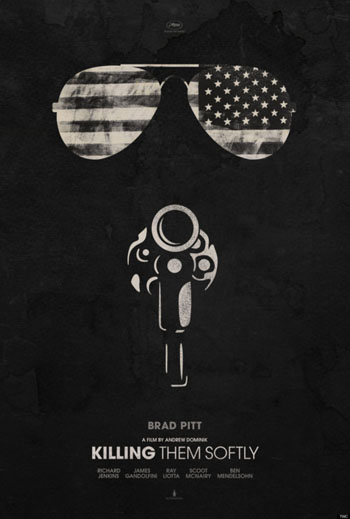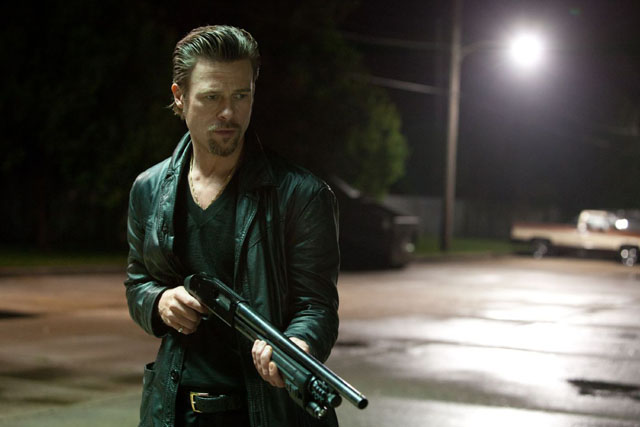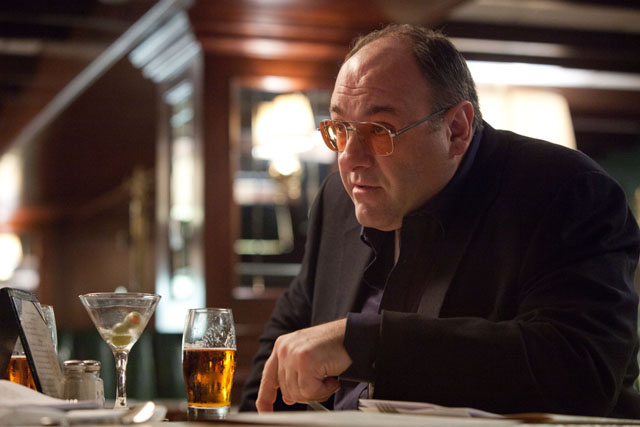“The movie’s poster says it all,” begins Time‘s Richard Corliss: “a pair of shades reflecting the American flag, and a gun where the nose and mouth would be. In Killing Them Softly, playing today at the Cannes Film Festival and opening in the US September 21, screenwriter-director Andrew Dominik wants you to know that the underworld is our world, with the same top-dog-eats-little-dog amorality, just expressed with naked ruthlessness. ‘This isn’t a country, this is America. And America is a business.’ It’s September 2008, at the national intersection of Obama-McCain Campaign and Lehman Brothers Meltdown, and the speaker is Jackie Cogan. Incarnated by Brad Pitt as a smart, supercool enforcer of gangland and corporate priorities, he is the criminal-industrial complex’s own Terminator, a machine as sleek, functional and unerring as his .44.”
The story, adapted from George V. Higgins’s 1974 novel Cogan’s Trade, “finds little fish swimming with sharks,” writes Dave Calhoun in Time Out London. “Two dreamy, penniless young crims, Frankie (Scoot McNairy) and Russell (Ben Mendelsohn), shoot up a backroom poker game run by Markie (Ray Liotta). Soon they have a cool and calm mob fixer, Jackie (Brad Pitt), on their tail, who in turn hires an assassin, Mickey (James Gandolfini); his handler is a backroom suit, Driver (Richard Jenkins). It’s all defiantly male, and the only woman who speaks is a prostitute, but it’s also pleasingly anti-macho and presents the world of gangsters as a chaotic shit-show forever undermined by failure and human fallibility…. Dominik (The Assassination of Jesse James by the Coward Robert Ford, Chopper) lays on a little thick both the state-of-the-nation nods… and the idea that this grimy noir is a metaphor for sickness and stupidity in the financial sector.” The Los Angeles Times‘ Steven Zeitchik even goes so far as to suggest that “though it was written before the Occupy movement took hold, it is arguably the first post-Occupy film.” Calhoun: “But put that aside, and Killing Them Softly is a cracking piece of storytelling, with a restrained balance of laidback chat and canny visual outbursts, and a delicious thread of gallows humor running through it.”
“Nothing in this coldly enjoyable and relentlessly classy genre trip is killed softly at all,” writes Guy Lodge at In Contention, “not the broken-bone crunch of the sound design, not the uproariously ripe work of its dream supporting ensemble and certainly not Dominik’s bewilderingly literal makeover of Higgins’s genre runaround into a portentous essay on capitalist failings in cusp-of-Obama America. Between its hat-in-hand referencing of the output of such tough-guy stylists as Michael Mann and William Friedkin, its balletically orchestrated explosions of the red stuff and, of course, that cred-boosting Cannes Competition berth, it seems inevitable that collective critical shorthand will come to label Killing Them Softly this year’s Drive, but those already forging the connection seem to be missing a crucial rift in the films’ sensibilities. Where Nicolas Winding Refn’s kandy-kolored fast-car fantasia was actively, even abrasively proud of the fact that it had nothing going on upstairs—that it was about nothing no much as the movies themselves—Killing Them Softly doesn’t miss a single moment to tell us how much more is on its mind than its nasty little kill-list narrative and expert, storm-colored styling.”
Still, for the Guardian‘s Peter Bradshaw, it’s “a slick ensemble-nightmare of middle-management mobster brutality and incompetence in the tradition of Goodfellas and Casino, Pulp Fiction and TV’s The Sopranos, with something of the opening voiceover monologue from the Coens’ Blood Simple: the one about being on your own…. Killing Them Softly is a reminder of what Tom Wolfe wrote about crime in his novel The Bonfire of the Vanities: it is not the dramatic or romantic notion of some brilliant desperado who knows what he wants and is prepared to go outside the law to get it. It is more a question of ruthless, greedy, stupid people who get themselves into a progressively worsening, violent mess.”
The Hollywood Reporter‘s Todd McCarthy focuses on the “style and attitude, which Dominik ladles on like sauce on ribs. Russell’s drug-addled disorientation is represented by multiple distortions of time, visual perception and sound; the pursuit of one victim is imaginatively covered entirely from the outside of the building in which the chase is consummated; Cogan arrives on the scene to the accompaniment of Johnny Cash’s ‘The Man Comes Around’; the just-scraping-by 21st century hoods drive late-’60s/early-’70s cars like a Riviera and Toronado; and one man’s execution is rendered from many angles in a slow-motion explosion of breaking glass and penetrating bullets so elaborate and prolonged that it resembles a self-standing art installation. In a related way, some of the dialogue scenes, especially a couple of near-monologues superbly delivered by Gandolfini as a booze-guzzling, sex-obsessed, past-his-prime hit man, almost have the feel of brilliant, free-standing acting class scenes.”
Justin Chang in Variety: “Appearing exclusively opposite Pitt, Richard Jenkins socks over his turn as a bespectacled, tight-laced mob liaison with a particular aversion to cigarette smoke. Sam Shepard has a too-brief turn as a local rough, but Liotta, in only a few minutes of screen time, makes poor Markie a figure of real pathos and enormous likability.” But for Entertainment Weekly‘s Owen Gleiberman, Brad Pitt is very much the star: “The thing about Pitt’s charismatic badasses—and this is what a lot of haters still miss about him as an actor—is that although they radiate a certain brawny physical fearlessness, they draw their strength from Pitt’s intelligence, his quicksilver-cool line readings and aura of awareness.”
More from Mark Adams (Screen), Ryland Aldrich (Twitch), Kevin Jagernauth (Playlist, A), Eric Kohn (indieWIRE) and Adam Woodward (Little White Lies). For indieWIRE, Anthony Kaufman talks with Dominik “about how directing is like playing Mr. Potato Head, why Softly speaks to the 2008 economic collapse and how, despite the violence, his movies are actually comedies.”
Updates, 5/25: Dominik is “using the structure of a self-policing underground economy of junkies, killers and administrators, greedy bastards all, to indict an above-ground system, the world into which the film is going to be released, and suggesting that the criminal satellite economy and the mainstream superstructure are functionally the same.” The LA Weekly‘s Karina Longworth: “But Dominik—whose last film, The Assassination of Jesse James by the Coward Robert Ford, was a masterpiece of visual storytelling similarly about law and outlaws and the slipperiness of myth and reality as an almost geographically genetic American imperative—doesn’t trust us to watch [his’] beautifully self-evident [opening scene] and get what he’s up to. So he keeps telling us…. Killing Them Softly is at its best when it’s essentially veering off-track. One assassination, shot in extreme slow-motion/bullet-time, a show-offy but stunning CGI set-piece, works as a gory parody of the current American action movie auto-pilot…. But it’s not an exaggeration to say that Dominik hammers his political point to death.”
“Genre exercises that are really stealth critiques of American mores are fine and dandy, but please, let us do at least a little bit of the interpretive work ourselves,” adds Mike D’Angelo at the AV Club.
“The film’s nihilistic, chatty-Cathy wiseguys may be closer to Beckett characters than Tarantino toughs, but the bombed-out landscapes are certainly located in a late-Bush Amerika that’s recognizably downbeat,” writes Time Out New York‘s David Fear. “‘Except there are no characters, just metaphors,’ moan the Twitterati, a swipe that conveniently ignores the nuanced performances of Pitt, Richard Jenkins as a go-between, Ben Mendelsohn as an Aussie smackhead and, notably, Gandolfini, who makes his martini-sucking sad sack the most sympathetic and hateful gargoyle in the bunch.”
“While it lacks the poetry and melancholy of Dominik’s previous film,” writes Glenn Heath Jr. for the L, “Killing Them Softly feels like a spiritual cousin to that masterful Western. Both deal with the subject of economic Manifest Destiny, and in this particular Gangster universe, pulling ones self up by the bootstraps has never been so punishing and filthy.”
“In Jesse James, the unrelenting quest for fame and fortune will get you nowhere but dead,” writes Budd Wilkins at the House Next Door. “Killing Them Softly, especially in its final scene, debunks the illusion that there’s any adhesive that can keep together the fabric of the body politic, delivering a curt rebuff to the bluff and bluster of election-eve sloganeering.”
“Dominik is a great meat-and-potatoes visual story-teller,” writes Simon Abrams at Press Play. “He paces scenes composed entirely of conversations, framing them with ostentatious care and dyspeptic whimsy: Killing Them Softly ultimately suggests Zodiac as directed by Paolo Sorrentino.”
More from Robbie Collin (Telegraph, 5/5), Jordan Cronk (PopMatters), Geoffrey Macnab (Independent) and Demetrios Matheou (Arts Desk). Oliver Lyttelton talks with Dominik for the Playlist.
Cannes 2012 Index: a guide to the coverage of the coverage. For news and tips throughout the day every day, follow @KeyframeDaily on Twitter and/or the RSS feed. Get Keyframe Daily in your inbox by signing in at fandor.com/daily.






